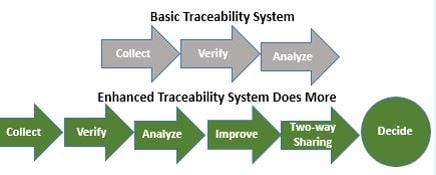Within the food and beverage industry there are a lot of misconceptions about the role technology plays in traceability. As a food and beverage producer, manufacturer, or distributor your supply chain says a lot about you. End to end traceability isn’t just about compliance, there are characteristics of traceability that can bring value add to your business.

“Most of the confusion in traceability lies within the role of technology and it is going to be different for every company,” Tejas Bhatt MS CFS. Director, Global Food Traceability Center Institute of Food Technologists.
On a daily basis mounds of data is collected on your business and your supply chain. By pairing technology with traceability, companies can recognize benefits beyond compliance including: reliable, relevant, and readily accessible data, which can turn into potential cost savings and profit pools. Potential benefits from traceability:
- Reduced Business Risk – Recall is the biggest reason companies implement traceability practices. In addition to reducing liabilities from recalls, companies can benefit from the liability of not making a bad product because all the ingredients are verifiable. Traceability decreases your liability because you can prove you were not part of an outbreak, and there can also be a reduction in company insurance policies.
- Operational Efficiencies - Tracking food from point of source to consumption allows for the collection of metrics along the way, providing better visibility into internal inefficiencies such as product loss. Traceability technology lays the foundation for companies to easily share information and get approved for the FDA’s Trusted Trader program. Incentives under the Trusted Trader program are reduced FDA targeting/targeting examination risk score resulting in lowered administrative costs.
- Market Access – Supply chain knowledge allows companies to develop niche products such as organic or gluten free. Large customers like Walmart are demanding that food and beverage supply chains are transparent, as this brings confidence to the customer base. The European Union and others might also request records to enter their markets.
Food traceability is defined as “the ability to access any or all information relating to that which is under consideration, throughout its entire life cycle, by means of recorded identifications,” (Olsen & Borit, 2013). What this signifies is that traceability is not about records and data, it’s about access to that information as a means of achievement.
Webinar Replay: How Traceability Improves Your Bottom Line
To gain a better understanding of traceability technology and its role in the supply chain and how to move from compliance to profit using technology; watch the webinar with traceability expert Tejas Bhatt, as he summarizes the results of extensive research conducted by the Institute of Food Technologists’ (IFT) at the Global Food Traceability Center (GFTC).
Replay on RKL YouTube Channel
